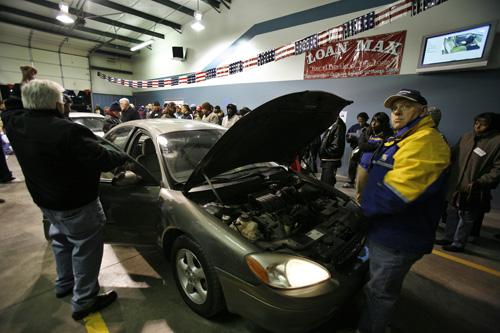States cracking down on title lenders

Ronnie Buchanan, left, owner of Bryan Buchanan Auto Auction, flags a bidder during a auction of repossessed cars at an auction in Montvale, Va., on Feb. 21. The auction runs through about 100 car title loan repossessions each month. The Associated Press
March 3, 2008
MONTVALE, Va. – The Dodge pickup has rust on the tailgate and a Harley-Davidson sticker on its back windshield. Beside it sits a Honda Accord with a big, white butterfly on the windshield and American flag butterflies on each side of the trunk.
They have one thing in common: Their owners didn’t pay off a car title loan, and now they’re getting ready for auction.
For years payday lenders have been the bad guy in the predatory lending debate while their close cousin, car title lenders, have cruised along unnoticed – and perhaps more disturbing for some – unregulated in several states. Many efforts to regulate the industry have failed as the lenders pour hundreds of thousands of dollars into legislative campaigns.
Advocates for the poor say they don’t have the resources to fight both industries at the same time. Once the payday lenders are in check, they vow to go after car title lenders.
They claim title loans – short-term, high interest loans secured by a car title – can be even more disastrous than payday loans.
Get The Daily Illini in your inbox!
“They can both trap borrowers in long-term debt, but with a payday loan the collateral is a personal check. With a car title loan, it’s the family’s probably most important asset,” said Leslie Parrish, senior researcher for the Center for Responsible Lending.
Car title lenders operate in nearly half the states, about a dozen of which have specific laws regulating how much the lenders can charge, Parrish said.
Where there are no laws specific to the industry title lenders operate under regulations governing pawn shop brokers or other lenders.
By structuring their loans as open-end credit, the lenders can charge triple-digit interest and whatever terms they wish as long as they don’t charge anything for 25 days. In most states, the entire loan is due in one month, but can be rolled over and new fees charged.
This year, legislation was introduced in at least eight states, from Florida to South Dakota. Last year, 16 states took on car title lenders, and six of those – Iowa, Mississippi, Nevada, Montana, Oregon and Utah – passed some sort of regulations.
Some have taken on both payday and car title lenders at once. New Hampshire legislators are close to an agreement on a 36 percent interest rate cap on payday and car title loans, and the governor there has said he would support it. Congress also banned payday lenders, car title lenders and tax refund anticipation loan companies from charging members of the military or their families more than 36 percent interest.






